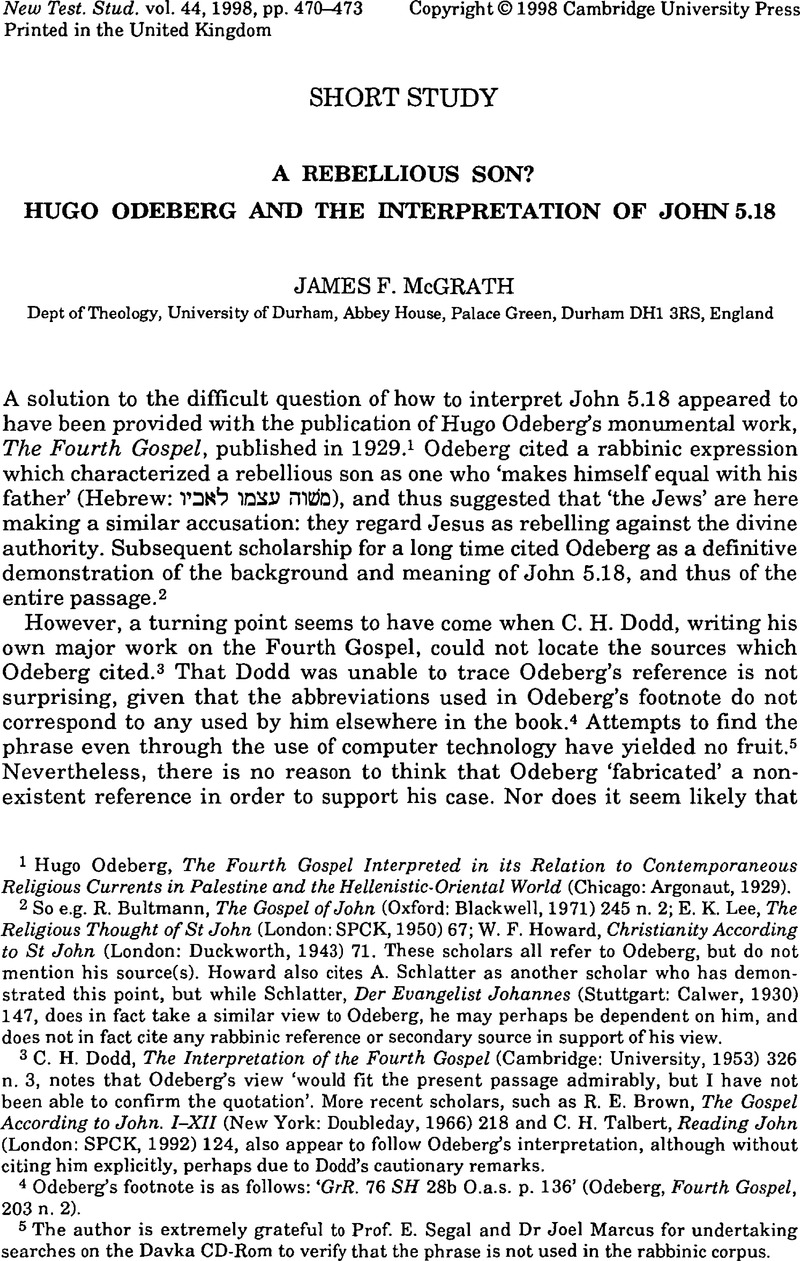Published online by Cambridge University Press: 05 February 2009

2 So e.g. Bultmann, R., The Gospel of John (Oxford: Blackwell, 1971) 245Google Scholar n. 2; Lee, E. K., The Religious Thought of St John (London: SPCK, 1950) 67;Google ScholarHoward, W. F., Christianity According to St John (London: Duckworth, 1943) 71.Google Scholar These scholars all refer to Odeberg, but do not mention his source(s). Howard also cites A. Schlatter as another scholar who has demonstrated this point, but while Schlatter, , Der Evangelist Johannes (Stuttgart: Calwer, 1930) 147Google Scholar, does in fact take a similar view to Odeberg, he may perhaps be dependent on him, and does not in fact cite any rabbinic reference or secondary source in support of his view.
3 Dodd, C. H., The Interpretation of the Fourth Gospel (Cambridge: University, 1953) 326CrossRefGoogle Scholar n. 3, notes that Odeberg's view ‘would fit the present passage admirably, but I have not been able to confirm the quotation’. More recent scholars, such as Brown, R. E., The Gospel According to John. I–XII (New York: Doubleday, 1966) 218Google Scholar and Talbert, C. H., Reading John (London: SPCK, 1992) 124Google Scholar, also appear to follow Odeberg's interpretation, although without citing him explicitly, perhaps due to Dodd's cautionary remarks.
4 Odeberg's footnote is as follows: ‘GrR. 76 SH 28b O.a.s. p. 136’ (Odeberg, Fourth Gospel, 203 n. 2).
5 The author is extremely grateful to Prof. E. Segal and Dr Joel Marcus for undertaking searches on the Davka CD–Rom to verify that the phrase is not used in the rabbinic corpus.
6 Genesis Rabbah 65.1 says of Esau, ‘So for forty years Esau used to ensnare married women and violate them, yet when he attained forty years he compared himself to his father (![]()
![]()
![]() ) saying, “As my father was forty years old when he married, so I will marry at the age of forty.”’ In b. Sanhedrin 71a R.Judah is cited as saying, ‘If his mother is not like his father (
) saying, “As my father was forty years old when he married, so I will marry at the age of forty.”’ In b. Sanhedrin 71a R.Judah is cited as saying, ‘If his mother is not like his father (![]()
![]() in voice, appearance and stature, he does not become a rebellious son.’ The author is indebted to Prof. E. Segal and Dr M. Frankel for pointing out these references.
in voice, appearance and stature, he does not become a rebellious son.’ The author is indebted to Prof. E. Segal and Dr M. Frankel for pointing out these references.
7 Dissertations 2.7; quoted by Davies, Margaret, Rhetoric and Reference in the Fourth Gospel (JSNTSup 69; JSOT/ Sheffield Academic, 1992) 130.Google Scholar
8 Sir 3.6–16.
9 Philo, Dec. 118.Google Scholar The similarity between what is asserted here and John 5.19, 30 is also significant.
10 Sentences of the Syriac Menander 2.20–4.
11 Sentences of the Syriac Menander 2.87–92. In the immediate context (vv. 94f.) he adds, ‘More than everything love your father, you shall fear him and honour him.’
12 Sentences of the Syriac Menander 2.198–201. Here we see clearly that, as long as the father lived, the son was subordinate. We may perhaps follow the logic of the saying in reverse and conclude that ‘making oneself equal to one's father’ was akin to wishing the father were dead. In connection with this see also Kenneth E. Bailey's interpretation of the parable of the prodigal son in Poet and Peasant (Grand Rapids: Eerdmans, 1976) 161–8.Google Scholar
13 See also Malina, Bruce J., Windows on the World of Jesus (Louisville, KY: Westminster John Knox, 1993) 2–4.Google Scholar
14 There is no reason that ήδιоν should be regarded as emphatic, since in Koine Greek it was often used in a reduced sense to mean simply ‘his’. Cf. Sanders, J. N., The Gospel according to St. John (ed. Mastin, B. A.; London: A. & C. Black, 1968) 99 n. 3; 164Google Scholar n. 3. Nonetheless, even if it is given its fuller sense this does not in any way affect the argument put forward in this paper.
15 Similar accusations, which appeal to the actions of Jesus in order to discount his claims, can be found elsewhere in John: cf. e.g. 8.13; 9.16, 24; 10.33; note also 7.27, 41f., 52, where accusations based on a contrast between what seems to be implied by Jesus' actions/words and his background are made in a similar fashion.
16 See the parallels from the Oxyrhynchus Papyri cited by Dodd, , ‘A Hidden Parable in the Fourth Gospel’, More New Testament Studies (Manchester: Manchester University, 1968) 32–8;Google Scholar also see Philo, Conf. Ling. 63Google Scholar, which bears witness to the same cultural assumption, and is of even greater interest because of its use in connection with the Logos.
17 On agency in the Fourth Gospel and in particular John 5 see Borgen, Peder, ‘God's Agent in the Fourth Gospel’, The Interpretation of John (ed. Ashton, John; Philadelphia: Fortress/London: SPCK, 1986) 67–78;Google ScholarHarvey, A. E., ‘Christ as Agent’, The Glory of Christ in the New Testament (ed. Hurst, L. D. and Wright, N. T.; Oxford: Clarendon, 1987) 239–50;CrossRefGoogle ScholarThompson, M. M., ‘John, Gospel of’, Dictionary of Jesus and the Gospels (ed. Green, Joel B., McKnight, Scot, Marshall, I. Howard; Leicester: IVP, 1992) 377–9;Google ScholarWitherington, B., John's Wisdom (Louisville: Westminster John Knox, 1995) 141.Google Scholar As Harvey notes, ‘the Son as the Father's agent par excellence … was empirically the case in ancient Middle Eastern commerce’ (‘Christ as Agent’, 241).
18 That the key problem with the objection of ‘the Jews’ is to be found in the words ‘made himself’ is suggested by a number of scholars, including Ashton, Barrett, Brown, Meeks, Neyrey and Pryor.
19 The author wishes to thank J. Truex for fruitful dialogue and helpful insights in discussing many of the points made in this article.